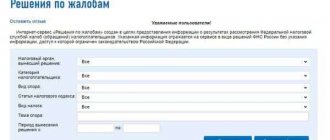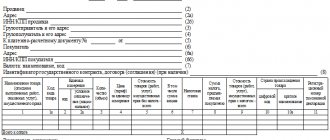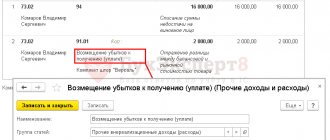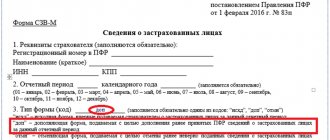How to check for account restrictions on the Federal Tax Service website
In general, taxpayers should find out about the blocking of accounts from the tax authorities.
According to paragraph 4 of Article of the Tax Code of the Russian Federation, inspectors are obliged no later than the next working day after the decision to suspend operations on a bank account is made to send the account owner a copy of the relevant document. This can be done via telecommunication channels or through your personal account. Also, a copy can be given to the taxpayer (his representative) in person. Request a tax reconciliation report from the Federal Tax Service via the Internet Request for free
However, in practice, the Federal Tax Service often neglects this responsibility. Moreover, there are no negative consequences for failure to comply. The courts refuse decisions about which inspectors did not notify taxpayers in violation of an article of the Tax Code of the Russian Federation (see, for example, resolution of the Federal Antimonopoly Service of the West Siberian District dated June 10, 2010 No. A45-23256/2009). Therefore, in most cases, taxpayers receive information about account blocking from their bank.
You can also check the presence or absence of a tax authorities’ decision to block an account (your own or a counterparty’s) using a special service on the Federal Tax Service website.
To do this, select the “Request for current suspension decisions” option in the “Request Type” menu. Next, in the fields that appear below, indicate the TIN of the organization, as well as the BIC of the bank in which the account being verified is opened (if you are interested in information about the counterparty’s account, the corresponding TIN and BIC can be found from the agreement concluded with him). After this, you need to click the “Send request” button. The result of the check will appear on the same page. If the Federal Tax Service has decided to block the account, the details of this document will be indicated.
What are the most common reasons for blocking?
The most common reasons for blocking an account at the initiative of the bank:
- Suspicion of transit of funds. For example, money came to the account of an entrepreneur, and he transferred it to the account of his spouse, who paid for the goods by card. A supporting document can be a receipt, which shows the purpose of the expenditure.
- Cashing out amounts. For example, an individual entrepreneur kept a savings account in a bank, which he regularly replenished with cash, and then decided to open a deposit in another bank. When cashing out funds, the bank may block it until the circumstances are clarified. To remove the blocking, an agreement to open a deposit account with more attractive conditions can help.
- Receipt of different amounts from a large number of counterparties. You can remove the bank's suspicions if you show contracts with all partners.
Accounts of individuals are blocked much less often than legal entities. But no one can completely guarantee that there will be no suspension of operations.
Banks very often play it safe and freeze any transactions that seem dubious to them. Therefore, if you are traveling abroad and will use a bank card there, and you have never left Russia before, it is better to warn your bank. Employees of a financial institution may suspect fraud after making a payment in the Virgin Islands or Thailand. As a result, you will be left without money when you urgently need it.
For more information about why transactions on an individual’s card can be blocked and how to avoid this, read this article by Brobank.
Reasons for introducing account restrictions
The tax office may suspend account transactions in five cases. Three of them are related to “documentary” violations, and two are related to non-payment of taxes and other payments.
Let's start with the first group. The Federal Tax Service has the right to block an account if, within 20 working days after the end of the established period, a declaration based on the results of the tax period, calculation of insurance contributions or 6-personal income tax (subclause 1, clause 3 and clause 3.2 of Art. Tax Code of the Russian Federation) are not submitted. There is a closed list of reasons why reporting on taxes and contributions is not considered submitted (clause 4.1 of Article of the Tax Code of the Russian Federation; see “On what grounds will tax authorities not accept reporting submitted after July 1”).
Submit reports free of charge to all regulatory authorities through the EDF operator
IMPORTANT
For failure to submit interim reporting, even if it is called a declaration (for example, for income tax), as well as financial statements, accounts are not blocked. This was repeatedly stated by officials of the Ministry of Finance (letters dated 04.07.13 No. 03-02-07/1/25590 and dated 19.08.16 No. 03-11-03/2/48777) and the Federal Tax Service (clause 20 of the appendix to the letter dated 17.04. 17 No. SA-4-7/ [email protected] ).
We also note that the Federal Tax Service has the right to inform the taxpayer in advance about the risk of seizure of a bank account in connection with failure to submit reports (clause 3.3 of Art. Tax Code of the Russian Federation). Notification is sent no later than 14 days before the decision to block is made. You can read it in the taxpayer’s personal account on the Federal Tax Service website (for more details, see “Accounts for unsubmitted reports will be blocked according to the new rules”).
The next reason for “freezing” an account concerns persons who are required to submit reports in electronic form via telecommunication channels through an EDF operator. If, within 10 working days from the date of occurrence of this obligation, the taxpayer has not concluded an agreement necessary for electronic document management with the Federal Tax Service, his account may be blocked (clause 5.1 of article 23 and subclause 1.1 of clause 3 of article 3 of the Tax Code of the Russian Federation).
REFERENCE
Persons required to report electronically include the largest taxpayers, as well as organizations and individual entrepreneurs whose average number of employees for the previous year exceeded 100 people.
In addition, these are newly created organizations with an average number of employees of more than 100 people (clause 3 of Article 80 of the Tax Code of the Russian Federation). Also, these are almost all organizations and individual entrepreneurs that submit VAT returns (clause 5 of Article 174 of the Tax Code of the Russian Federation). And those who paid income for the year to more than 10 individuals (clause 2 of Article 230 and clause 10 of Article 431 of the Tax Code of the Russian Federation) must send electronic payments for contributions and personal income tax reporting. For more details, see “Electronic reporting: who is obliged to report to regulatory authorities via the Internet.” Another “documentary” violation is related to non-compliance with the regulations on electronic document flow with the inspection. The account may be blocked if the taxpayer delays sending to the Federal Tax Service for more than 10 working days an electronic receipt for receipt of the TCS request for the submission of documents, explanations or a notice of summons to the inspectorate (subclause 2, clause 3, article 3 of the Tax Code of the Russian Federation).
Receive requirements and send requests to the Federal Tax Service via the Internet
The second group of grounds for arresting an account includes two situations. The first is the inspection making a decision on the collection of taxes, fees, and contributions from money in bank accounts (clause 2 of Article 2 of the Tax Code of the Russian Federation). Let us remind you that the Federal Tax Service can make such a decision only after the deadline for voluntary payment, which is indicated in the requirement addressed to the taxpayer, has expired. The second situation is to ensure the recovery of the amounts specified in the decision based on the results of the audit. This is possible if the Federal Tax Service has already imposed a ban on the alienation (pledge) of other property, but its “accounting” value is less than the additional accrued arrears (subclause 2, clause 10, article 101 of the Tax Code of the Russian Federation).
Situations in which operations are suspended
The suspension of any payment transactions, including electronic ones, means freezing the account of an organization or individual entrepreneur, as a result of which the use of this account becomes impossible.
It is noteworthy that you can top up your account; this suspension does not affect this in any way in some cases. Electronic funds that an organization or individual entrepreneur has, or rather, settlement transactions on them, can also be suspended, while only expense transactions are stopped; it is still possible to replenish the account with electronic funds.
According to the current tax legislation, there are three situations in which transactions on accounts (it should be understood that they are also electronic) can be suspended:
- failure to provide a completed tax return;
- the organization did not provide a receipt to the tax authority within the framework of current legislation;
- in pursuance of the decision made by the tax authority.
It is noteworthy that in the first case, operations are suspended temporarily: exactly until the payer provides the tax authority with a correctly completed and valid tax return.
According to the provisions of Article 76 of the Tax Code, suspension of transactions does not in any way affect expenditure transactions associated with the next payment of insurance contributions, social contributions, payments, as well as taxes and fees, whose turn for payment to the state budget came earlier than what was received on execution of the decision of the tax authority to the bank.
In addition, it is impossible to freeze those transactions on accounts that relate to electoral or special (should be understood as a referendum fund). All other electronic spending transactions are suspended subject to appropriate decision.
Article 23 of the Tax Code spells out the responsibilities of payers, including organizations. Thus, according to the norms of paragraph 5, the organization is obliged to accept from the tax authority documents on which calculations are made and tax returns are filled out, and then send a receipt notifying the receipt of the documents.
If such a receipt was not sent, then the organization cannot fill out the tax return correctly, and, therefore, falls under Article 76 of the Tax Code. The suspension of debit transactions on accounts, including electronic ones, is used as a preventive measure.
What are the consequences of blocking a current account?
“Freezing” a current account means that it is impossible to make payments for transactions with counterparties, since debit transactions on the account will be unavailable. This may lead to delays in relevant obligations and, as a consequence, to the emergence of demands for payment of penalties and fines established by the contract. Also, violation of the payment deadline under contracts may give the counterparty the right to withdraw from the contract and recover damages from the violator.
Difficulties in work will also arise if the account of the supplier, contractor or performer is blocked. Although income transactions are not “frozen,” the taxpayer will not be able to dispose of incoming funds.
Find out about the taxes paid by the counterparty and the violations committed by him Start an audit
Seizing an account can also put the company's employees at risk. After all, in order to pay wages (including in cash through the cash register), it is also necessary to make an expense transaction. And the requirements for payment of wages are in the same queue with the requirements of the Federal Tax Service for the payment of taxes (clause 2 of Article 855 of the Civil Code of the Russian Federation; see “The order of payments in the payment order in 2022”). Therefore, wages can be paid from a “frozen” account only on the basis of a special document: a writ of execution, a court order, a decision of the labor inspectorate or a certificate from the labor dispute commission.
What does suspension of operations mean?
An account that is blocked cannot carry out debit transactions: for example, it is impossible to transfer money from it to a counterparty or withdraw funds using a checkbook.
At the same time, not all expense transactions are always stopped. So, if the account is blocked for the amount specified in the decision to collect the arrears, then operations in excess of the specified amount can be carried out from the current account ( paragraph 3 , 5, paragraph 2, article 76 of the Tax Code of the Russian Federation ). The suspension of transactions on accounts does not apply to payments in a queue earlier than the write-off of taxes ( paragraph 3, paragraph 1, article 76 of the Tax Code of the Russian Federation ). The order of payments is established in clause 2 of Art. 855 Civil Code of the Russian Federation . According to this norm, if there are insufficient funds in the account to satisfy all the requirements presented to it, the following priority is determined:
- first of all - according to executive documents providing for the transfer or issuance of funds from the account to satisfy claims for compensation for harm caused to life and health, as well as claims for the collection of alimony;
- secondly - according to executive documents providing for the transfer or issuance of funds for settlements for the payment of severance pay and wages with persons working or who worked under an employment agreement (contract), for the payment of remuneration to the authors of the results of intellectual activity;
- in the third place - according to payment documents providing for the transfer or issuance of funds for settlements of wages with persons working under an employment agreement (contract), instructions from the tax authorities to write off and transfer debts for the payment of taxes and fees to the budget, as well as instructions from the Social Insurance Fund and the Pension Fund for writing off and transferring insurance premiums;
- fourthly - according to executive documents providing for the satisfaction of other monetary claims;
- in the fifth place - according to other payment documents in calendar order.
In other words, writing off taxes on behalf of the tax authority is a third-priority payment.
Accordingly, if there is a lack of funds, banks are obliged to first make payments of the first and second stages, and only then write off taxes. Payments of one queue are made in the calendar order of receipt of documents. For example, a payment order for the payment of wages and a collection order from the Federal Tax Service Inspectorate belong to the same queue - the third, therefore, if a payment order for wages arrives at the bank earlier than the Federal Tax Service Inspectorate’s order, the bank will be obliged to execute it first, and then, if there is money left in the account, – instruction of the Federal Tax Service ( Letter of the Ministry of Finance of the Russian Federation dated March 6, 2014 No. 03 02 07/1/9689 ).
If operations are suspended due to failure to submit a declaration (based on clause 3 of Article 76 of the Tax Code of the Russian Federation ), in the absence of an order from the tax authority to transfer the tax (corresponding penalties, fines) to the budget, the bank has the right to execute settlement documents (checks) of the bank client for the payment of wages to persons working under an employment contract ( Letter of the Ministry of Finance of the Russian Federation dated July 11, 2013 No. 03 02 07/1/26857 ).
The decision of the tax authority to suspend transactions on accounts and transfers of electronic funds is subject to unconditional execution by the bank ( clause 6 of Article 76 of the Tax Code of the Russian Federation ).
Please note that from 01/01/2014, in accordance with the amendments made by Federal Law dated 07/23/2013 No. 248-FZ in paragraph 12 of Art. 76 of the Tax Code of the Russian Federation , if there is a decision to suspend operations on accounts, banks are prohibited from opening a new account or granting the right to use new electronic means of payment.
In order to ensure the requirements of this paragraph, the Federal Tax Service in Letter No. PA -4-6/3003 dated 02/20/2014 announced that from 02/03/2014 the Internet service “Information on the availability of decisions on the suspension of transactions on taxpayer accounts” was put into operation, which allows banks receive up-to-date information about the existence of a decision to suspend transactions on the accounts of the taxpayer (fee payer, tax agent) and transfers of his electronic funds in the bank. The Internet service is open, publicly available and intended for use in banks.
Let us remind you that before the relevant amendments were made, organizations and entrepreneurs could not open an account only in those banks to which the decision to suspend account transactions was sent.
It will also not be possible to close a seized account if there is a balance of money on it, since when the account is closed, the balance must be spent, and debit transactions cannot be made. Even if there is no balance in the account and the account is closed, the decision to suspend operations will still remain in effect, and it will not be possible to open a new account either. Closing by the bank of the account in respect of which this decision was made is not the basis for recognizing the corresponding decision as invalid or terminated ( Resolution of the Federal Antimonopoly Service VSO dated 01.02.2013 in case No. A 19-12728/2012 ).
Therefore, the organization or entrepreneur is interested in having the account unblocked as quickly as possible.
What to do if your current account is blocked
If operations on the account are suspended based on a decision of the Federal Tax Service, you need to contact the inspectorate to find out the reason for the blocking. As already mentioned, the tax authority is obliged to send the taxpayer a copy of the relevant document no later than the next day after the account is blocked (clause 4 of Art. Tax Code of the Russian Federation). Also, the right to receive copies of decisions of the Federal Tax Service is fixed in subparagraph 9 of paragraph 1 of article of the Tax Code of the Russian Federation.
In addition, the servicing bank has information about the reason for the blocking. Therefore, perhaps a faster way to obtain this information is to contact the managers of the credit institution. Unless, of course, the bank itself notified the client about the suspension of operations on the account (see “Banks were recommended to immediately notify clients about the blocking of accounts”).
Once the reason for the arrest has been determined, measures can be taken to unblock the account.
Clause 1, Article 76 of the Tax Code of the Russian Federation
Suspension of transactions on bank accounts and electronic money transfers is used to ensure the execution of the decision to collect taxes, fees, insurance premiums, penalties and (or) fines, unless otherwise provided for in paragraphs 3 and 3.2 of this article and subparagraph 2 of paragraph 10 of Article 101 of this Code.
(As amended by federal laws dated November 26, 2008 No. 224-FZ; dated July 27, 2010 No. 229-FZ; dated June 27, 2011 No. 162-FZ; dated May 2, 2015 No. 113-FZ; dated July 3, 2016 No. 243-FZ) Suspension of transactions on an account means the bank ceases all debit transactions on this account, unless otherwise provided by paragraph 2 of this article.
The suspension of transactions on the account does not apply to payments, the order of execution of which, in accordance with the civil legislation of the Russian Federation, precedes the fulfillment of the obligation to pay taxes, fees, insurance premiums, as well as to transactions for writing off funds to pay taxes (advance payments), fees, insurance premiums, corresponding penalties and fines and their transfer to the budget system of the Russian Federation. (As amended by federal laws dated November 26, 2008 No. 224-FZ; dated July 3, 2016 No. 243-FZ)
Suspension of electronic money transfers means the bank’s termination of all operations entailing a decrease in the balance of electronic money, unless otherwise provided by paragraph 2 of this article. (Paragraph introduced - Federal Law dated June 27, 2011 No. 162-FZ)
Transactions on special election accounts and special referendum fund accounts are not subject to suspension. (Paragraph introduced - Federal Law dated April 26, 2016 No. 110-FZ)
How to unblock a current account
In most cases, the easiest way is to perform those actions, the failure of which caused the “freezing”. So, if the account is blocked for failure to submit a declaration, RSV or 6-NDFL, then the necessary report should be sent. And if the reason for the arrest is failure to pay a tax or contribution, then you need to transfer payments (including from third party accounts; see: “How to fill out a payment slip when paying tax for another person: explanations from the Federal Tax Service”), and transfer the relevant information to the Federal Tax Service .
Fill out payment slips with current BCC, income codes and other mandatory details Fill in for free
As a general rule, the decision to cancel the seizure of an account is made by the inspectorate within the next day after receiving documents confirming the elimination of the reason for the blocking. Another day is required to transmit this decision to the bank. Thus, restrictions on the account must be lifted two business days after the taxpayer has completed the necessary actions (clauses 3.1, 3.2 and 4 of Article of the Tax Code of the Russian Federation).
But in some cases, it will not be possible to release the account from seizure using the above method. This may be a consequence of both the specific reason for the blocking and the illegality of the actions of the Federal Tax Service. In these situations, you need to do the following.
If the reason for blocking is to secure an audit decision, the taxpayer can access the account without appealing the relevant decision. To do this, you need to top up your account balance so that it exceeds the additional accrued amounts. And then the inspection will be obliged to “unfreeze” the account in terms of excess (clause 9 of Art. Tax Code of the Russian Federation, letter of the Ministry of Finance dated January 16, 2013 No. 03-02-07/1-10). After this, you can proceed to appeal the decision of the Federal Tax Service, if there are reasons for this.
If the arrest of the account was the result of errors or unlawful actions of the inspectorate, then the only way to remove the restrictions is to appeal the relevant decision.
For how long are accounts blocked?
The account blocking period differs depending on the reason:
- 5 days. For such a period, banks block specific transactions, except for operations of crediting money to an account - Federal Law No. 115, article 7, paragraph 10.
- 30 days. The account is blocked for such a period based on the order of Rosfinmonitoring.
- Indefinitely. The account is blocked by court decision if the owner finances terrorist or extremist operations. The restriction is valid until a decision is made to cancel the blocking.
In practice, the suspension of the movement of funds through accounts lasts longer than standard periods. The bank automatically extends the block until the situation is resolved. During this period, you may be asked to provide additional documents. The account may be frozen even for the next few months.
Clause 12, Article 76 of the Tax Code of the Russian Federation
If there is a decision to suspend operations on the accounts of a taxpayer-organization and transfers of its electronic funds in a bank, as well as on the accounts of persons specified in paragraph 11 of this article, banks do not have the right to open accounts, deposits, deposits for this organization and these persons and provide this organizations have the right to use new corporate electronic means of payment for electronic money transfers, with the exception of special election accounts, special referendum fund accounts. (As amended by federal laws dated July 27, 2010 No. 229-FZ; dated June 27, 2011 No. 162-FZ; dated July 23, 2013 No. 248-FZ; dated November 4, 2014 No. 347-FZ; dated April 26, 2016 No. 110-FZ)
The procedure for informing banks about the suspension of operations and about the lifting of the suspension of operations on the accounts of a taxpayer-organization and transfers of his electronic funds in the bank, as well as on the accounts of persons specified in paragraph 11 of this article, is established by the federal executive body authorized for control and supervision in area of taxes and fees, in agreement with the Central Bank of the Russian Federation. (Paragraph introduced - Federal Law dated July 23, 2013 No. 248-FZ)
Clause 5, Article 76 of the Tax Code of the Russian Federation
The bank is obliged to report to the tax authority in electronic form information about the balances of funds (precious metals) of the taxpayer-organization in bank accounts, operations on which are suspended, as well as about the balances of electronic funds, the transfer of which is suspended, within three days after the day of receipt a decision of this tax authority to suspend transactions on the bank accounts of a taxpayer-organization. The formats for the bank to report information on the balances of funds (precious metals) on the accounts of the taxpayer-organization in the bank and on the balances of electronic funds and the procedure for the bank to send the specified message in electronic form are approved by the Central Bank of the Russian Federation in agreement with the federal executive body authorized for control and supervision in the field of taxes and fees. (As amended by federal laws dated July 27, 2010 No. 229-FZ; dated November 3, 2010 No. 287-FZ; dated June 27, 2011 No. 162-FZ; dated June 29, 2012 No. 97-FZ; dated November 27, 2017 No. 343-FZ)
Clause 7, Article 76 of the Tax Code of the Russian Federation
The suspension of transactions of a taxpayer-organization on his bank accounts and transfers of his electronic funds is effective from the moment the bank receives a decision of the tax authority to suspend such operations, such transfers and until the bank receives a decision of the tax authority to cancel the suspension of transactions on the accounts of the taxpayer-organization in the bank and transfers of his electronic funds, the decision of the tax authority to lift the suspension of transfers of his electronic funds. (As amended by federal laws dated November 26, 2008 No. 224-FZ; dated June 27, 2011 No. 162-FZ)
When a decision is sent to the bank to suspend transactions on the accounts of a taxpayer-organization in the bank and transfers of its electronic funds in electronic form, the date and time of its receipt by the bank are determined in the manner established by the Central Bank of the Russian Federation in agreement with the federal executive body authorized for control and supervision in the field of taxes and fees. (As amended by federal laws dated June 27, 2011 No. 162-FZ; dated June 29, 2012 No. 97-FZ)
If, after making a decision to suspend transactions on the accounts of a taxpayer-organization in a bank, the name of the taxpayer-organization and (or) the details of the account of the taxpayer-organization in the bank, operations on which were suspended by this decision of the tax authority, have changed, this decision is also subject to execution by the bank in relation to a taxpayer-organization that has changed its name, and transactions on an account with changed details. (Paragraph introduced - Federal Law dated July 27, 2010 No. 229-FZ)
If, after a decision was made to suspend electronic money transfers of a taxpayer-organization, the name of the taxpayer-organization and (or) the details of the corporate electronic means of payment of the taxpayer-organization, the transfers of electronic funds using which were suspended by this decision of the tax authority, have changed in the bank, this decision is subject to execution by the bank also in relation to a taxpayer-organization that has changed its name, and electronic money transfers using a corporate electronic means of payment that has changed details. (Paragraph introduced - Federal Law dated June 27, 2011 No. 162-FZ)
Clause 2.1 of Article 76 of the Tax Code of the Russian Federation
Decisions to suspend transactions on bank accounts and electronic money transfers in order to ensure obligations to pay taxes, fees, and insurance contributions by a party to an investment partnership agreement - the managing partner responsible for maintaining tax records (hereinafter in this article - the managing partner responsible for maintaining tax accounting), in connection with the implementation of the investment partnership agreement, are accepted by the head (deputy head) of the tax authority at the location of such managing partner. (As amended by Federal Law dated July 3, 2016 No. 243-FZ)
In order to ensure the obligations for the payment of taxes, fees, insurance premiums by the managing partner responsible for maintaining tax accounting, in connection with the implementation of the investment partnership agreement (with the exception of corporate income tax arising in connection with the participation of this partner in the investment partnership agreement) in the first place operations on bank accounts and transfers of electronic funds of the investment partnership are suspended. (As amended by Federal Law dated July 3, 2016 No. 243-FZ)
If there are no funds in the accounts of the investment partnership or there are insufficient funds, a decision to suspend operations on bank accounts and electronic money transfers may be made in relation to the accounts of the managing partners. In this case, first of all, such a decision is made in relation to the accounts of the managing partner responsible for maintaining tax records.
If there are no or insufficient funds in the accounts of the managing partners, a decision to suspend transactions on bank accounts and transfers of electronic funds of the partners may be made in relation to the accounts of the partners in an amount proportional to the share of each of them in the common property of the partners, determined on the date the debt arose.
A decision to suspend transactions on bank accounts and electronic money transfers of managing partners and associates may be made no earlier than a decision to collect tax from funds in the bank accounts of these persons.
(Clause introduced - Federal Law dated November 28, 2011 No. 336-FZ)
Arbitration practice for blocking accounts
The Federal Tax Service has recently been very strict in ensuring that inspectors moderate their ardor in matters of blocking (since in the case of illegal blocking, the budget suffers). Meanwhile, there are still quite interesting disputes related to blocking.
Signing of the declaration by an unauthorized person
. The inspection interviewed the head of the one-day company, who said that he did not sign the company’s declarations. From this, the Federal Tax Service Inspectorate concluded: the declarations were signed by an unauthorized person, that is, they were not signed, that is, they were not submitted. And on the basis of clause 3 of Art. 76 The Tax Code of the Russian Federation blocked the account. The court overturned the inspection decision, since the manager was included in the Unified State Register of Legal Entities, the interviewee did not indicate a specific declaration, the company recognizes the reporting, etc. (see resolution of the Federal Antimonopoly Service of the Ural District dated March 21, 2014 No. F09-1036/14).
Blocking for failure to submit a non-existent declaration
. The Federal Tax Service may require standard declarations (VAT, profit) from a taxpayer working only on UTII, or a property tax declaration from someone who does not have taxable assets. If the declaration is not submitted, the inspectorate blocks the account, but loses in court. If you want to know the details of the case, study the resolution of the Federal Antimonopoly Service of the Volga-Vyatka District dated March 21, 2013 No. A17-2944/2012.
Blocking if there is property
. If the taxpayer provides guarantees for payment of taxes or has property needed for repayment, the inspectorate does not have the right to block the account. A typical example: the inspectorate blocks the account, although the tax debt is less than the total value of the property that can be used to pay taxes - the court is on the side of the company (see resolution of the Federal Antimonopoly Service of the Moscow District dated 04.05.12 No. A40-102291/11-20-428).
Bureaucratic mistakes of the Federal Tax Service
. It happens that inspectors block an account even though they have not sent demands for payment of taxes, that is, they have missed one of the stages of collection. The court recognizes such blocking as illegal. An example is the resolution of the AS of the Ural District dated January 28, 2015 No. F09-9313/14.
Clause 13, Article 76 of the Tax Code of the Russian Federation
The rules established by this article are applied taking into account the specifics provided for by this paragraph in relation to ensuring payment of corporate income tax for a consolidated group of taxpayers.
The suspension of transactions of participants of a consolidated group of taxpayers on bank accounts is carried out in the same sequence in which the tax authority carries out the procedure for foreclosure on funds (precious metals) in bank accounts in accordance with paragraph 11 of Article 46 of this Code. (As amended by Federal Law No. 343-FZ dated November 27, 2017)
Decisions to suspend transactions on the bank accounts of a responsible participant in a consolidated group of taxpayers and other participants in this group may also be made in the manner provided for by this article in the event of failure to submit a tax return on corporate income tax for a consolidated group of taxpayers to the tax authority within 10 days. expiration of the deadline for submitting such a declaration. In this case, decisions to suspend transactions on bank accounts can be made simultaneously to all participants in this group.
(Clause introduced - Federal Law No. 321-FZ dated November 16, 2011)
←Article 75 of the Tax Code of the Russian Federation, Article 77 of the Tax Code of the Russian Federation→
What amount can be blocked?
The blocking applies only to the amount specified in the decision. You can spend funds in excess of this amount without restrictions - letter of the Ministry of Finance of Russia dated 04/15/2010 No. 03-02-07/1-167, dated 07/09/2008 No. 03-02-07/1-268, resolution of the Federal Antimonopoly Service of the North-Western District dated 09/13/2010 No. A56-75387/2009.
If a foreign currency account has been suspended, then the currency equivalent of the amount specified in the decision is frozen at the exchange rate of the Central Bank of the Russian Federation on the date the suspension began, in accordance with clause 2 of Art. 76 of the Tax Code of the Russian Federation, letters of the Ministry of Finance of Russia dated December 30, 2008 No. 03-02-07/1-542, dated April 15, 2009 No. 03-02-07/1-186, dated September 21, 2009 No. 03-02-07/1- 434.








